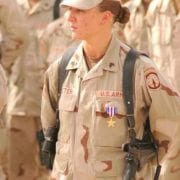On the Role of Women
By Lance Wang, Editor
I must be honest. I spent over 20 years in the Army, almost all in Infantry units. I enjoyed the camaraderie of all-male units until I arrived at Brigade level. Periodically, I would leave the world of polite society and head out to the field among other men – to go do “manly” things as President Theodore Roosevelt would have said.
Over the years, I have often found myself on one side of an issue because I found the arguments in favor of the other side vacuous, specious or unsupportable. I have never been in favor of lowering standards to accommodate women in previously all-male skill fields such as the combat arms, but to make such an argument, I must be willing to concede that if women can meet the male standards, they should be allowed to do the job.
“Tzedek tzedek tirdof” – “Justice, justice you shall pursue” admonishes Deuteronomy 16:20. It’s not about what is “fair,” but rather what is “just” that we are commanded to pursue. Anybody who has worn the uniform is more aware than anyone that life is not fair. Indeed, it was a mantra that I taught many of my own soldiers. “Get over it. Life isn’t fair and neither is the Army.” Discussions on the issue (which is a policy issue) must be based upon sound reasoning where justice can be applied – blinded to anything other than fact-based logic.
So with that said, should women be subject to Selective Service registration and by extension, the draft? We already have a gender-integrated military since the advent of the all-volunteer force. About 15% of the today’s active duty military is women, and 18% of the reserve components. Even without women in the combat arms, the majority of combat support and combat service support career fields are open to women, so it would stand to reason that in a full or partial mobilization that involves the draft, women would be necessary to expand the army to the necessary wartime strength.
In the end, the purpose of an army is to provide for war. Instead of focusing on one’s gender, the focus should be upon ensuring that each soldier, sailor, airman, coast guardsman or marine meets the standards for their position. To arbitrarily deny those women who meet established standards from serving to their maximum abilities is not just.
It is interesting to note that the same rubric I use to examine the issue of the mobility of women within our military allows me to visit the issue in Israel regarding the place of women at worship at the Western Wall. Recently Prime Minister Netanyahu, under pressure from ultra-Orthodox elements within Israel, shelved plans to allow denominations of Judaism which support equality for women in prayer and ritual, to allow mixed prayer at our holiest of sites.
Again we find ourselves in a position where arguments are made by dogmatic, fundamentalist views – ones which do not take into account the constant reinterpretation of our holiest of texts based upon our intellectual and moral growth as a people. Rather, we now have several continuums of Judaism which coexist, yet do not always agree with each other’s interpretations of Torah. If Israel purports to be a modern democracy as opposed to a theocracy, it must find a way to balance the needs of multiple denominations within Judaism. There must be areas of common interest (including our survival as one people) that allow us to unite as opposed to divide.
As for the role of women in today’s society, I defer to 19th Century orator Ernestine Rose, “I suppose you all grant that woman is a human being. If she has a right to life, she has a right to earn a support for that life. If a human being, she has a right to have her powers and faculties as a human being developed. If developed, she has a right to exercise them.” I’m not sure that I could justify using prejudices of the past as precedent to say that things should be other than so.
Volume 71. Number 3. Fall 2017





Leave a Reply
Want to join the discussion?Feel free to contribute!